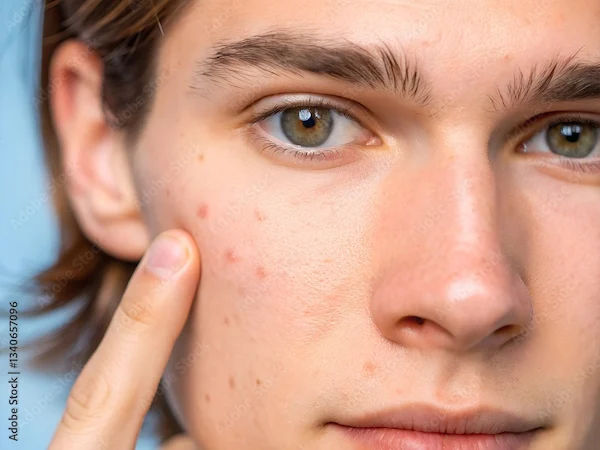Does Niacinamide Help With Acne?
Learn what is niacinamide and how it can help with acne. Let’s explore its use, benefits, and considerations. Niacinamide will allow you to get the most flawless skin more efficiently and effectively.

Written by Dr Sonia Bhatt
Last updated on 3rd Jul, 2025
Acne is a common skin condition that affects people of all ages, causing discomfort and self-consciousness. Niacinamide, a form of vitamin B3, has become a popular skincare ingredient due to its gentle yet effective properties. It helps reduce inflammation, regulate oil production, and strengthen the skin's barrier, making it a powerful ally in the fight against acne. If you're wondering whether niacinamide can help with acne, this article will explore its benefits, how it works, and how you can incorporate it into your skincare routine for clearer, healthier skin.
What is Niacinamide?
Niacinamide, also known as nicotinamide, is a water-soluble form of vitamin B3. It's a powerful antioxidant that has a wide range of skin benefits. Unlike some active ingredients in skincare products that might irritate or dry out the skin, niacinamide is typically gentle, making it suitable for all skin types, including sensitive skin.
Niacinamide works in several ways to improve skin health, making it a popular ingredient in both over-the-counter products and prescription treatments. In addition to acne management, it’s known for brightening the skin, reducing the appearance of fine lines and wrinkles, and improving the skin's overall texture and barrier function.
How Does Niacinamide Help With Acne?
Niacinamide offers multiple benefits for acne-prone skin. Its effectiveness in managing acne is attributed to several key mechanisms:
1. Anti-Inflammatory Properties
One of the primary benefits of niacinamide for acne-prone skin is its ability to reduce inflammation. Acne is often accompanied by redness, swelling, and irritation. Niacinamide works by calming these inflammatory responses, which can lead to less noticeable breakouts. It helps soothe the skin, reducing the size and appearance of acne lesions while minimising irritation caused by other acne treatments.
2. Regulates Sebum Production
Excessive oil production, or sebum, is one of the main factors contributing to acne development. When excess oil clogs pores, it provides a breeding ground for acne-causing bacteria. Niacinamide has been shown to regulate sebum production, helping to keep oil levels balanced. By doing so, it helps reduce the likelihood of clogged pores and the formation of new acne breakouts.
3. Strengthening the Skin Barrier
The skin's barrier is crucial for protecting against external irritants, bacteria, and environmental pollutants. Acne treatments, especially those that contain harsh ingredients like benzoyl peroxide or salicylic acid, can sometimes weaken the skin's natural barrier, leading to dryness and irritation. Niacinamide strengthens the skin barrier function, promoting hydration and maintaining skin smoothness and resilience. A strong skin barrier helps the skin recover faster from acne flare-ups and makes it less prone to breakouts in the future.
4. Mild Antibacterial Properties
While not a substitute for antibiotics, niacinamide has mild antibacterial properties that can help reduce the presence of acne-causing bacteria on the skin. This contributes to clearer skin and fewer breakouts.
5. Improving Skin Texture and Tone
Niacinamide helps improve the texture and tone of the skin by promoting collagen production and reducing hyperpigmentation. This leads to smoother, more even-toned skin, which is beneficial for those with acne scars or dark spots.
6. Supports Skin Repair
Niacinamide enhances the skin's natural repair processes, helping to regenerate skin cells and promote healing. This is particularly beneficial for those with acne scars, as it aids in minimising their appearance over time.
7. Antioxidant Effects
Niacinamide is a powerful antioxidant that helps neutralise free radicals, which can damage skin cells and contribute to premature ageing and skin damage. By protecting the skin from oxidative stress, niacinamide supports overall skin health and helps prevent damage that can exacerbate acne.
8. Melanin Regulation
Niacinamide helps regulate melanin, the pigment responsible for skin colour, by inhibiting its transfer to keratinocytes (the skin cells that make up the outer layer). This action helps reduce hyperpigmentation, which often appears as dark spots or uneven skin tone, a common issue after acne breakouts. By preventing the spread of excess pigment, niacinamide can effectively treat post-inflammatory hyperpigmentation (dark spots left behind by acne), leading to a more even and brighter complexion.
How to Use Niacinamide for Acne
Niacinamide is a versatile ingredient that can be easily incorporated into your daily skincare routine. Here’s how to use it effectively:
Choose the Right Product: Look for skincare products that contain niacinamide as an active ingredient. These can be in the form of serums, creams, lotions, or gels. Ensure the product is suitable for your skin type and contains a concentration of niacinamide between 2% to 10%.
Cleanse Your Skin: Start with a gentle cleanser to remove dirt, oil, and makeup from your skin. This helps ensure that the niacinamide serum or cream can penetrate effectively.
Apply Niacinamide Serum: After cleansing, apply a few drops of niacinamide serum to your face. Use your fingertips to gently massage it into your skin, focusing on areas prone to acne. Allow the serum to absorb fully before moving on to the next step.
Moisturise: Follow up with a moisturiser to keep your skin hydrated. Even if you have oily skin, it's important to moisturise to maintain the skin barrier and prevent overproduction of oil.
Use Sunscreen: Niacinamide can make your skin more sensitive to sunlight, so it's crucial to apply a broad-spectrum sunscreen with at least SPF 30 during the day. This will protect your skin from UV damage and prevent further irritation.
Consistency is Key: Use niacinamide products consistently for the best results. It may take several weeks to see noticeable improvements in your skin, so be patient and stick with your skincare routine.
Patch Test: If you're trying niacinamide for the first time, do a patch test on a small area of your skin to ensure you don't have any adverse reactions.
Combine with Other Acne Treatments: Niacinamide can be used alongside other acne treatments like benzoyl peroxide or salicylic acid. However, new products should be introduced gradually to avoid irritation.
Monitor Your Skin: Pay attention to how your skin responds to niacinamide. If you experience any irritation or adverse reactions, reduce the frequency of use or consult a dermatologist.
Considerations for Using Niacinamide to Treat Acne
Niacinamide is generally well-tolerated by most individuals, including those with sensitive skin. However, as with any new skincare ingredient, some users may experience minor irritation. Symptoms such as redness, stinging, or a rash may occur, indicating a potential adverse reaction. If these symptoms arise, it is advisable to discontinue use immediately and consult a dermatologist for guidance on the appropriate course of action.
While niacinamide is effective for many in treating acne and hyperpigmentation, its efficacy may vary. Individuals with severe or cystic acne might require more potent treatments, such as oral medications or professional dermatological interventions, to achieve the desired results.
Conclusion
Niacinamide is a promising skincare ingredient with various benefits for those struggling with acne. Its anti-inflammatory, sebum-regulating, and skin-repairing properties make it an excellent choice for reducing acne symptoms and improving overall skin health. While it may not completely replace stronger acne treatments, niacinamide can be a valuable part of an acne management regimen, especially for those with mild to moderate acne.
When incorporated correctly into your daily skincare routine, niacinamide can help prevent breakouts, minimise acne-related redness and inflammation, and fade dark spots left behind by acne. As always, if you're unsure whether niacinamide is right for your skin or if you're dealing with persistent or severe acne, it's best to consult with a dermatologist to develop a personalized treatment plan.
Consult Top Dermatologist
Consult Top Dermatologist

Dr. Kaushiki Hajra
Dermatologist
5 Years • MBBS, MD Dermatology, Venerology & Leprosy
Kolkata
MCR SUPER SPECIALITY POLY CLINIC & PATHOLOGY, Kolkata

Dr. Priyankar Misra
Dermatologist
10 Years • MBBS,MD(D V & L)
Kolkata
Tridermis Skin and hair clinic, Kolkata
(25+ Patients)

Dr. Sonal Jain
Dermatologist
9 Years • MBBS, MD Dermatology, Venerology & Leprosy
Kolkata
MCR SUPER SPECIALITY POLY CLINIC & PATHOLOGY, Kolkata

Dr. Madhab Datta
Dermatologist
5 Years • MBBS, MD (DVL)
Kolkata
Dr. Madhab Datta's Clinic, Kolkata

Dr. Sonal Jain
Dermatologist
9 Years • MBBS, MD (Skin & VD), DNB (DVL), Fellowship in Dermato Surgery
East Midnapore
VIVEKANANDA SEBA SADAN, East Midnapore

